仁爱版英语八年级上册unit1 topic1 sectionA
仁爱版新版八年级(上册)英语Unit1topic1SectionA课件

放映结束 感谢各位的批评指导!
谢 谢!
让我们共同进步
Join参加,加入
• join+ 团体 • join in通常指参加某种活动,尤其指和其他人一起参加某
项活动。 ①May I join in the game?我可以参加这个比赛吗? take part in指参加群众性活动、会议、劳动、游行等,往 往指参加者持有积极的态度,起一份作用,有时与join in 可互换。例句: • We should take part in school activities.我们应该积极参 加学校的活动。 = join in
Me, too.常用于自己的做法或想法与别人的一致时。 e.g. —I like drinking milk in the morning.我喜欢早晨喝牛 奶。
—Me, too. 我也是。
also , as well
also, 也 I also like drinking milk in the morning
He is going to write a letter tonight.
He will write a book one day.
see sb. do sth.看见某人做了某事;强调看见动作的全过 程,现在动作已结束。 see sb. doing sth. 看见某人正在做某事,强调动作正在进行。
• prefer 更喜欢+ 名词/动名词/不定式 • P 109 • I prefer apples. • I prefer playing basketball. • I prefer to play basketball.
prefer … to… 和。。。相比更喜欢。。。 I prefer apples to bananas. 和香蕉相比,我更喜欢苹果。
仁爱版英语八年级上册unit1_topic1_sectionA_and_sectiomB
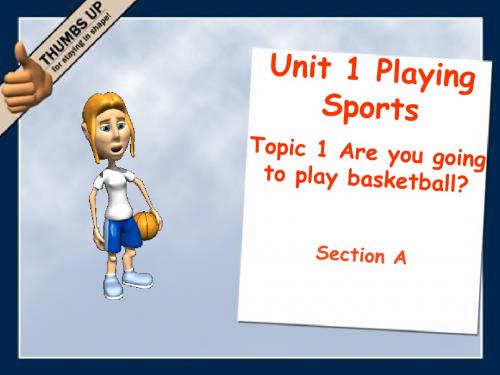
Read and say (录音1)
Michael: Hi, Kangkang.
play basketball ? I saw you Kangkang: Hi, Michael. Are you going to ________________
play basketball ________ almost every day ________ during the summer holidays.
提示词 Yes, quite a bit/a lot. No, seldom. basketball football
Do you … much?
swimming running
volleyball
table tennis cycling rowing skating skiing
提示词 Yes, I am.
basketball
football swimming running volleyball
Are you going to join the school … club?
table tennis
cycling rowing skating No, I’m not. I’m going to … skiing
Practice
用所给的词适当形式填空 will/is going to join (join) the football game against No.2 1.Jack ___ High School this Sunday. is leaving (leave)for Japan next month. 2.My uncle __ 3.I am going to (be) a doctor when I grow up. will be (be)sunny later on today. 4.--it ___ 5.Our teachers will\are going to visit (visit) the Great Wall if it does’t rain tomorrow. is going to rain (rain) 6.Look at the cloud,It _
仁爱版英语八年级上册_unit1_topic1_sectionA

Yes, quite a bit/a lot.
Do you … much?
No, seldom.
仁爱版英语八年级上册
提示词 basketball football swimming running volleyball table tennis cycling rowing skating skiing
Which sport do you like better, … or …? I like … better. Which sport do you prefer, … or …? I prefer …
仁爱版英语八年级上册
Which sport do you prefer, … or …?
I prefer …
hope (that) 从句 e.g:I hope (that) you are coming to the party.
7.prefer "更喜欢" prefer doing/ to do sth,更喜欢、宁愿做某事 e.g: Do you prefer watching /to watch TV at home?
仁爱版英语八年级上册
Which sport do you like better, … or …?
I like … better.
仁爱版英语八年级上册
提示词 basketball football swimming running volleyball table tennis cycling rowing skating skiing
I saw Tom playing basketball on the playground yesterday.
2.almost "几乎,差不多" 放在be动词后边,或行为动词之前。 e.g: I almost fell off my bike.
仁爱版八年级英语上册Unit1 Topic1 Section A优质课教案设计

Unit1 Playing SportsTopic1 I’m going to play basketball.SectionA 优质课教案教学设计思路:本节课主要活动为SectionA的1a。
通过1a中Michael和Kangkang的对话,呈现了本课所要学的语法重点:be going to do结构表示一般将来时。
首先通过一首英文歌曲引入be going to do句型和运动。
由一个短视频让学生了解更多运动后,让学生看图片说运动。
再由歌曲唱出单词和句型。
然后通过小游戏和音频结合,让学生听音辨运动,从而巩固新单词。
然后由拖延症患者Mr.—Going—to—do 引出be going to do句型进行反复练习。
再根据学生的周日计划,导入Michael 和Kangkang的周日计划,对1a进行泛听,并完成1b。
接着学生通过看视频精听对话,判断1c四种说法是否正确。
在充分听和读1a对话内容之后,根据1a 造句。
然后整合1a和1d内容并改编,结合当下大热的电视剧《择天记》进行对话练习,再次巩固课文内容。
最后小组合作写一篇暑假计划报告,升华本课内容。
I. Teaching aims1. Knowledge aims:(1)学习并掌握关于运动的新词汇:football, row, table tennis,…(2)能正确运用be going to do表达自己的计划。
2. Skill aims:(1)能听懂有关运动计划简单对话和陈述。
(2)能正确地口头表达有关运动计划的话题。
(3)通过对SectionA的学习,学生能够写出自己的暑假计划,并讨论各自将要做的事。
3. Emotional aims:(1)帮助学生养成运动的好习惯,学会强身健体,唤醒学生的运动意识。
(2)培养学生的执行能力,拒绝拖延。
Ⅱ.The key points and difficult points1. Key points:能正确、熟练地运用be going to do句型。
仁爱版英语八年级上册Unit1 Topic 1词块整理

八年级U1T2复习资料Section A 词块整理1.举办一场足球赛2.患病,病倒3.乐意做4.不要紧5.继续努力6.帮某人一个忙7.在......方面做得好8.乱扔9.立刻/10.介意做某事11.持续做某事12. 练习做某事13.把......踢给......重点句型:1.你介意教我吗?2.我把球踢给你。
3.你介意我再试一次吗?4.你介意不要把你的自行车放这吗?5.你介意不要乱扔瓶子吗?Section B 词块整理1.对某人大声叫喊2.尽某人最大努力3.生某人的气4.谈论,讨论5.向某人道歉6.为某事感到遗憾7.确信做某事8.学会团队合作9.完成某人的家庭作业重点句型:1.迈克尔不擅长足球但是他尽力了。
2.不要对彼此生气。
3.我对我所说的感到抱歉。
4.他们学会团队是很重要的。
5.我的爸爸给我的弟弟买了一个篮球。
语法:双宾语结构Section C 词块整理1.最受欢迎的运动之一2.起先3.在恶劣的天气里4.有......的历史5.形成,产生6.阻止某人做某事7.遵守规则8.例如9.越来越流行10.后天11.全世界/12.做某事对某人来说很重要本节词义转换:play→player invent→inventor→invention本节词义辨析:a number of/the number of重点句型:1.篮球是美国最受欢迎的运动之一。
2.有一个世纪的历史。
3.对你和其他选手来说作为一个团体很重要。
4.篮球在全世界变得越来越流行。
Section D 词块整理1.仅仅为了娱乐2.使......变成3.围......坐4.享受阳光本节词义辨析:other/another/the other/others语法:双宾语结构一般将来时时:will do sth. (中考必考)八年级U1T2复习资料答案Section A 词块整理1.举办一场足球赛have a soccer game2.患病,病倒fell ill/be ill3.乐意做be glad to do sth.4.不要紧Not at all.5.继续努力keep trying6.帮某人一个忙give sb. a hand7.在......方面做得好do well in/be good at 8.乱扔throw sth. around9.立刻at once / right away10.介意做某事mind doing sth. 11.持续做某事keep/go on doing12. 练习做某事practice doing sth. 13.把......踢给......kick sth.to sth.重点句型:1.你介意教我吗?Would you mind teaching me?2.我把球踢给你。
仁爱版八年级英语上册UNIT 1 TOPIC 1 Section A教案
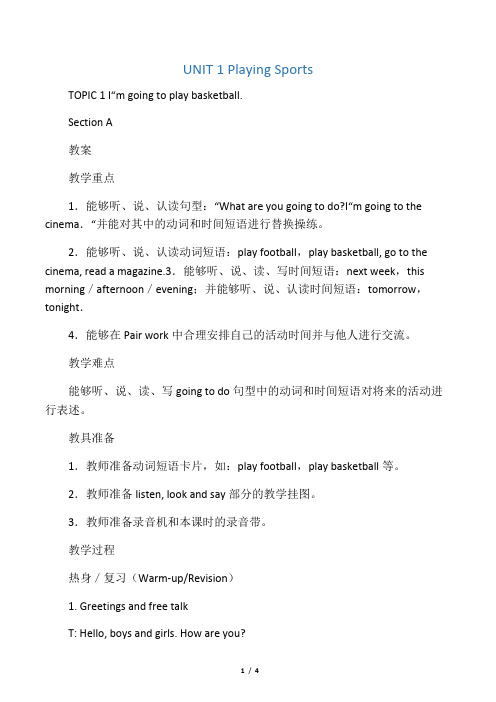
UNIT 1 Playing SportsTOPIC 1 I“m going to play basketball.Section A教案教学重点1.能够听、说、认读句型:“What are you going to do?I“m going to the cinema.“并能对其中的动词和时间短语进行替换操练。
2.能够听、说、认读动词短语:play football,play basketball, go to the cinema, read a magazine.3.能够听、说、读、写时间短语:next week,this morning/afternoon/evening;并能够听、说、认读时间短语:tomorrow,tonight.4.能够在Pair work中合理安排自己的活动时间并与他人进行交流。
教学难点能够听、说、读、写going to do句型中的动词和时间短语对将来的活动进行表述。
教具准备1.教师准备动词短语卡片,如:play football,play basketball等。
2.教师准备listen, look and say部分的教学挂图。
3.教师准备录音机和本课时的录音带。
教学过程热身/复习(Warm-up/Revision)1. Greetings and free talkT: Hello, boys and girls. How are you?S: Hello, Miss. I’m fine, thank you, and you?T: I’m fine, too. Thank you very much.(Say hello to the teachers together)教师课前放歌曲“What Are You Going to Do?“学生初步感知be going to do句型。
师生进行日常会话,可将重点放在动词短语的问答上,如:T:What day is it today ?S:It“s Tuesday.T:What day is it tomorrow ?S:It“s Wednesday.T:What do you usually do On Wednesdays/in the evening?S:I usually read books.呈现新课1. Lead in(1)学生朗读书本段落进行学习。
Unit1+Topic1+Section+A课件+2022-2023学年仁爱版八年级英语上册
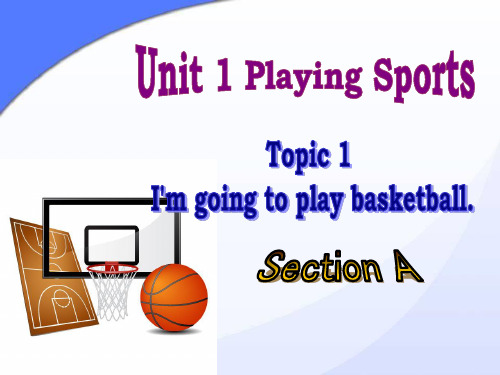
[dʒɔɪn] v.
[tiːm] n.
practice ['præ ktɪs] v.
Before the game, we practiced quite a lot with
classmates.
[kwaɪt] adv.
Because we know practice makes perfect. (熟能生巧)
Listen again and mark T (True) or F (False). Circle the key words.
1. Michael is going to play football. ( )
2. Michael doesn’t like· playing basketball,
Many... are going to join the... We are going to practice...
Many students came and cheered us
on.
In the end(最后), we won the game. be going to+ V原形
—What are you going to do this weekend? —I’m going to...
同……进行一场篮球赛
1.Find more English words about sports.(积累生词:词义、音标)
2.Recite 1a. 3.Finish the workbook(SA)练习册。
2 Make a dialog with your partner, using the following sentences.
run-running ski-skiing(滑雪)
仁爱版英语八年级上册 Unit1 Topic1 SectionA 参考教案

(最新版)Unit1Topic1 SectionA参考教案Ⅰ. Material analysisSection A and Section B 的内容整合,建议用三个课时上完。
本节课为单元第一课和第二课时,用两课时上完。
主要活动为Section A 的1a和2。
通过Michael和Kangkang的对话,呈现了本课所要学的语法重点:将来时be going to do结构。
结合本单元的话题Playing Sports, 呈现了重点短语:play basketball/football, have a ba sketball/football game, cheer … on, win (the game), prefer doing等。
Playing Sports这个话题和学生们的生活紧密相连,容易激发学生的学习兴趣。
但要正确使用be going to do对学生来说还是有一定困难的。
困难一:be动词和主语不一致(多数学生);困难二:不会正确地将do替换成具体动词(少数学生)。
所以,要求老师以课本文本内容为依据,结合学生的实际生活,引导学生正确地使用be going to do谈论自己的运动计划,并能用书面表达形式写出自己的运动计划。
Ⅱ. Teaching aimsKnowledge aims:1. 能根据音标正确朗读出下列单词表中的单词:team, win, cheer, row, quite,during, against, practice…2. 能正确拼读并运用单词表中的黑体单词。
3. 能正确运用be going to do 表达运动计划。
4. 能正确地运用prefer doing结构表达喜好,如:prefer swimming, preferrowing等。
5. 能运用本课所学语言,就自己的运动计划与他人交流。
Skill aims:1. 能听懂有关运动计划和运动爱好的简单对话和陈述。
2. 能正确地口头表达有关运动计划和运动爱好的话题。
仁爱英语八年级上册Unit1 知识汇总课件
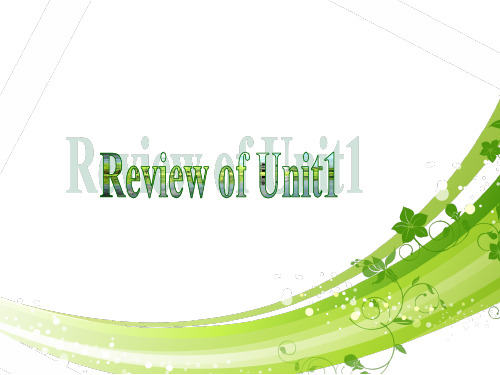
4. I hope our team will win.我希望我们队获胜。
(1)hope常用于以下两种结构。
hope to do sth.希望做某事 hope + that 从句 (2)win 赢得 过去式为won ,名词形式是winner
5.Would you like to come and cheer us on?你愿意来为我们加油吗?
be sorry for 为……感到抱歉、难过
6.You are sure to have more fun.你们一定会玩得更开心。 be sure to do sth.确信做某事。 如果sure 后面的主语和前面的主语是同样的,就用be sure to do sth.;如 果不是同一个主语就用be sure that…
4. Basketball is both an indoor and outdoor game.篮球是户内运动,也是户外运 动。 both …and 意为“两者都……”,这个短语作主语时,谓语动词要用复数形式。 5. The goal is to throw the ball through the other side’s basket, and to stop the other team from doing so.(比赛)目标是将球投入对方的篮筐而得分,并 阻止对方这样做。 (1)through 介词,意为“通过,穿过”,指从物体的中间通过,穿过。 (2)stop … from doing sth.意为“阻止……做某事” 6. You can throw it from any part of the court…你可以从球场的任何地方把球 投进球篮…… any 后接可数名词单数形式或不可数名词,意为“任何,任一” 7. But it is more important for you and the other players to play as a team.但对 于你和其他队员来说,团队合作是很重要的。 It is + 形容词+(for sb.)+to do sth.意为“(对于某人而言)做……是……样 的”。这是一个由it 做形式主语的句型,真正的主语是后面的动词不定式。 It is + 形容词+(of sb.)+to do sth.意为“(对于某人而言)做……(品质) 8. A large number of people enjoyed basketball.许多人喜欢篮球。 a large number of 意为“大量的,许多的”,相当于lots of , many ,只修饰可数 名词。
仁爱英语八年级上册Unit1Topic1SectionA教学设计

5.阅读作业:阅读一篇关于友谊的文章,并完成相关练习,如填空、选择、判断等,提高阅读理解能力。
6.写作作业:结合课堂讨论和所学知识,撰写一篇关于友谊的短文,要求内容丰富、结构清晰、表达准确。
7.拓展作业:鼓励学生了解不同文化背景下友谊的表现形式,可通过查阅资料、观看视频等方式,提高跨文化交际意识。
5.学科关联性:本章节内容与学生的现实生活紧密相连,有利于学生将所学知识运用到实际情境中。同时,通过学习英语,学生可以拓宽国际视野,增强跨文化交际意识。
三、教学重难点和教学设想
(一)教学重难点
1.重点:本章节的重点在于让学生掌握关于友谊的新词汇、短语、句型以及一般现在时的用法。
难点:如何让学生在实际情境中熟练运用一般现在时,尤其是主语为第三人称单数的动词变化规则。
3.教师指导:教师在小组讨论过程中,给予适当的指导,引导学生正确运用所学知识。
(四)课堂练习
1.听力练习:教师播放关于朋友交往的对话,让学生听后回答问题,检测学生的听力理解能力。
2.口语练习:学生进行角色扮演,模拟真实场景,运用所学词汇、句型和语法进行口语表达。
3.阅读练习:教师提供关于友谊的文章,让学生阅读并完成相关练习,提高阅读理解能力。
2.重点:提高学生的听力理解能力和口语表达能力。
难点:培养学生准确捕捉关键信息,以及在真实语境中运用所学知识进行流畅的口语交流。
3.重点:培养学生的阅读理解能力和写作能力。
难点:引导学生将所学知识运用到写作中,提高文章的连贯性和表达能力。
(二)教学设想
1.创设情境:结合学生的生活实际,创设关于友谊的情境,让学生在真实语境中学习、运用英语。
(仁爱英语八年级上册)Unit 1 Topic 1 Section A(共26张PPT)

知识P精r讲oject English
I hope our team will win.
hope to do sth. 意为“希望做某事”。 hope+that从句,that 可以省略,课文中就是此用法。 win 意为“赢,赢得”。可作及物动词或不及物动词,课文是 不及物动词用法。过去式为won;winner 意为“胜利者”。
be going to后面接动词原形,表示即将发生的动作或情况。 be动词随着主语的人称和数的变化而变化,句末常含有表示将 来的时间状语。
玛利亚打算去看电视。 Maria is going to watch TV. 他们打算去踢足球。 They are going to play football.
practice every day.
T
()
T
3.Michael and Kangkang are in Class 3.
()
4.Both Michael and Kangkang hope their team will win.
()
知识P精r讲oject English
Read 1a and fill in the blanks.
1.能掌握用be going to的结构表达一般将来 时; 2.能正确运用不同句型,表达偏好与优先选 择。
Thank you
-莉莉经常跳舞吗? -是的,经常跳。 -Does Lily dance much? -Yes, quite a lot.
知识P精r讲oject English Sports
A: Which sport do you prefer … or …?
B: I prefer … A: Do you … much?
仁爱版英语八年级[上册]教材同步详细讲解
![仁爱版英语八年级[上册]教材同步详细讲解](https://img.taocdn.com/s3/m/c528c41291c69ec3d5bbfd0a79563c1ec5dad7fd.png)
仁爱英语八年级上册Unit 1 topic 1 Section A 语言点讲解 1. I saw you play basketball almost every day during the Summer holidays. 常见的感官动词有:see, watch, hear, smell, feel 等。
后可接①动词ing 形式,表此动作正在发生。
②动词原形,不表此动作正在发生, 表此动作已完成或存在的事实。
① Do you smell something ? (burn) 答案:burning ② I often see him basketball after class. ( play ) 答案:play 2. There is going to be a basketball game between Class Three and our class this Sunday. There be 句型:表某地有某物. 而have 表示某人有…(1)There is/ are..表现在某地有某物,is/are 取决于后面的名词是单数还是复数,单数用is 复数用are,如①There is a pen and two rulers on the desk.②There are two rulers and a pen …(2) There was/were …表过去某地有某物。
was/were 的用法也遵循就近原则。
(3)There will be 或 There is/are going to be 表某地将有某事物。
不能说成 There will have …(题) a match in our school between Class Three and Class Four next week. 3. Would you like to come and cheer us on? ----- Sure, to come and cheer us on? ----- Sure, I’I’d love to. (1)Would you like + 不定式? 表建议或邀请。
仁爱版英语八年级上册教材同步讲解及练习附答案

仁爱英语八年级上册Unit 1 topic 1Section A语言点讲解1.I saw you play basketball almost every day during the Summer holidays.常见的感官动词有:see, watch, hear, smell, feel 等。
后可接①动词ing形式,表此动作正在发生。
②动词原形,不表此动作正在发生, 表此动作已完成或存在的事实。
① Do you smell something ? (burn) 答案:burning② I often see him basketball after class. ( play ) 答案:play2.There is going to be a basketball game between Class Three and our class this Sunday.There be 句型:表某地有某物. 而have 表示某人有…(1)There is/ are..表现在某地有某物,is/are取决于后面的名词是单数还是复数,单数用is 复数用are,如①There is a pen and two rulers on the desk.②There are two rulers and a pen…(2) There was/were…表过去某地有某物。
was/were的用法也遵循就近原则。
(3)There will be 或There is/are going to be 表某地将有某事物。
不能说成There willhave…(题) a match in our school between Class Three and Class Four next week.3.Would you like to come and cheer us on? ----- Sure, I’d love to.(1)Would you like + 不定式?表建议或邀请。
(完整版)仁爱英语八年级上册Unit1、2、3、4课文翻译
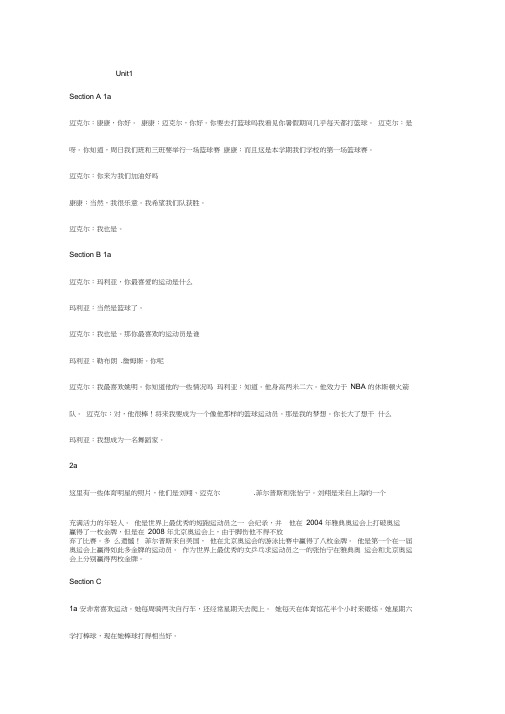
Unit1Section A 1a迈克尔:康康,你好。
康康:迈克尔,你好。
你要去打篮球吗我看见你暑假期间几乎每天都打篮球。
迈克尔:是呀。
你知道,周日我们班和三班要举行一场篮球赛康康:而且这是本学期我们学校的第一场篮球赛。
迈克尔:你来为我们加油好吗康康:当然,我很乐意。
我希望我们队获胜。
迈克尔:我也是。
Section B 1a迈克尔:玛利亚,你最喜爱的运动是什么玛利亚:当然是篮球了。
迈克尔:我也是。
那你最喜欢的运动员是谁玛利亚:勒布朗.詹姆斯。
你呢迈克尔:我最喜欢姚明。
你知道他的一些情况吗玛利亚:知道。
他身高两米二六。
他效力于NBA 的休斯顿火箭队。
迈克尔:对,他很棒!将来我要成为一个像他那样的篮球运动员。
那是我的梦想。
你长大了想干什么玛利亚:我想成为一名舞蹈家。
2a这里有一些体育明星的照片,他们是刘翔、迈克尔.菲尔普斯和张怡宁。
刘翔是来自上海的一个充满活力的年轻人。
他是世界上最优秀的短跑运动员之一会纪录,并他在2004 年雅典奥运会上打破奥运赢得了一枚金牌,但是在2008 年北京奥运会上,由于脚伤他不得不放弃了比赛。
多么遗憾!菲尔普斯来自美国,他在北京奥运会的游泳比赛中赢得了八枚金牌。
他是第一个在一届奥运会上赢得如此多金牌的运动员。
作为世界上最优秀的女乒乓求运动员之一的张怡宁在雅典奥运会和北京奥运会上分别赢得两枚金牌。
Section C1a 安非常喜欢运动。
她每周骑两次自行车,还经常星期天去爬上。
她每天在体育馆花半个小时来锻炼。
她星期六学打棒球,现在她棒球打得相当好。
她还擅长跳跃。
下周末将举行校运动会。
她打算参加跳高和跳远比赛。
她的同学们将会为她加油。
他们确信她会赢。
Section D1a昨天,着名足球明星大卫.贝克汉姆和他的队友抵达北京。
明天他的球队将和中国国家队进行一场比赛。
球迷们非常兴奋。
遗憾的是他们不会停留很长时间。
后天他们将动身去日本。
TOPIC 2 Would you mind teaching me?Section A1a康康:迈克尔,请你帮个忙好吗迈克尔:当然。
1.1 Unit 1 Topic 1 Section A(课件)-八年级英语上册仁爱版
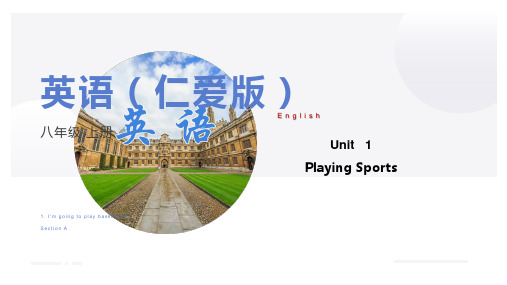
Task 5.
Read 1a and fill in the blanks. Michael is going to pblaasyketball _________ because he and his classmates are going toahgavinesta basketball game ________ Class Three on Sundawyin. All of them hopecthheeeirr team will _______. Kangkang will go and ________
eg: She is planning to take part in/join in the high jump.
她打算参加跳高。
Task 8.
Make a dialog with your partner, using the following sentences.
A: Which sport do you prefer …
Task 7. Key points
1. I prefer rowing.
(1)prefer(过去式\过去分词需双写 preferred) 后可 直接接动词ing形式或动词不定式, 表更喜欢…, 用法同like/ love: prefer sth 更喜欢某物 eg:I prefer bananas. 我更cook meals
She is going to wash clothes
What is he going to do ?
He is going to wash clothes .
What are you going to do on Sundays ?
仁爱版八年级英语上册Unit1 Topic1 Section A 优质课教案设计(云南省)
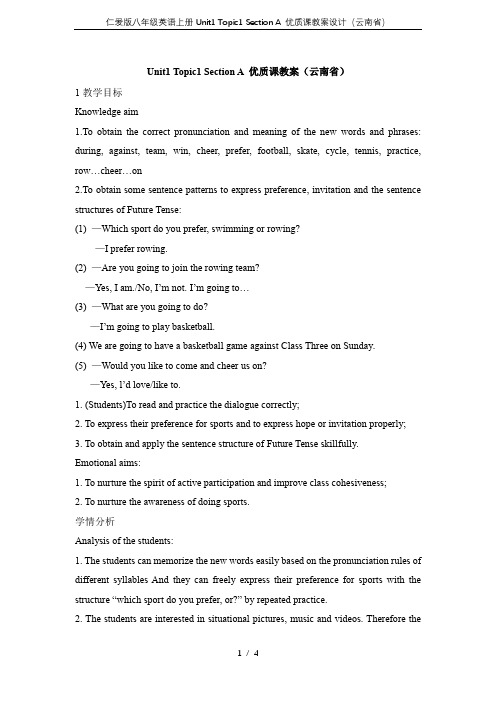
Unit1 Topic1 Section A 优质课教案(云南省)1教学目标Knowledge aim1.To obtain the correct pronunciation and meaning of the new words and phrases: during, against, team, win, cheer, prefer, football, skate, cycle, tennis, practice, row…cheer…on2.To obtain some sentence patterns to express preference, invitation and the sentence structures of Future Tense:(1) —Which sport do you prefer, swimming or rowing?—I prefer rowing.(2) —Are you going to join the rowing team?—Yes, I am./No, I’m not. I’m going to…(3) —What are you going to do?—I’m going to play basketball.(4) We are going to have a basketball game against Class Three on Sunday.(5) —Would you like to come and cheer us on?—Yes, l’d love/like to.1. (Students)To read and practice the dialogue correctly;2. To express their preference for sports and to express hope or invitation properly;3. To obtain and apply the sentence structure of Future Tense skillfully.Emotional aims:1. To nurture the spirit of active participation and improve class cohesiveness;2. To nurture the awareness of doing sports.学情分析Analysis of the students:1. The students can memorize the new words easily based on the pronunciation rules of different syllables And they can freely express their preference for sports with the structure “which sport do you prefer, or?” by repeated practice.2. The students are interested in situational pictures, music and videos. Therefore thepictures with new words or the theme song of Rio Olympics of 2016 help deepen the students’ memory.3.On the basis of speaking, listening, reading and practice students can understand and apply the Future Tense sentence structure.3重点难点Key points:1. To obtain the pronunciation of new words and their usages;2. To talk about preference, hope and send invitations correctly;3. To obtain the Future Tense and apply the “be going to” structure correctly.Difficult points:1. To obtain and apply the four sentence structures(affirmative sentence/negative sentence/general question sentence / Wh-question sentence)of “be doing to” skillfully. 4教学过程41第一学时411教学活动活动1【讲授】Topic1 I’m going to play basketball Section AStage1 Warming-up(热身活动)step 1 To play the theme song and let the students listen and recollect the Rio Olympic Games To Create a vigorous atmosphere and let the students predict today’s topic. Step2 To rise the question why sports is do popular? and list the advantages of doing sports to pave the way for talking about sports and preference.Stage 2 PresentationStep1 V ocabularyTo teach new words by phonetic sound, associative memory method and making sentences to help the students memorize new words and expand their vocabulary, for example, ing/ɪŋ/sing/ring/during ain/en/gain/again/against eer/ɪə/beer/deer/cheer Step2 To show some of the sports by pictures and words and to review what the students’ have learned about sports and to learn the new.Step3 To learn new sentence patterns “Which sport do you like better, …or...?”/ “Which sport do you prefer/prefer to do, ...or…?” by combining pictures, words and sentencestructures.Step4Task1: Role-play: in 2(Page2)To show the whole dialogue of exercise 2 in Page 2. And then to let the Ss talk in pairs. Step5 To show the picture of la and and let the students predict the dialogue.Step6Task2: Listen to 1a and answer four questions(including1b)1. What is Michael doing to do?2. What are they talking about?3. Is Kangkang going to cheer Michael on?Step 7Task3: 1cListen again and watch the video of 1a and then mark T or F活动2【讲授】Topic1 I’m going to play basketball Section AStep 8Task4: 1d Read la and fill the blanksTo assign this task to one of the groups and to better familiarize the text the teacher should let the students read 1a and fill in the blanks in 1d.Step 9 To select some of the key sentences and lead to the grammar points: see (saw sb doing sth/do sth).Step 10 The Future Tense “be doing to”To show some of the sentences in the text with “be doing to do…” structure. And then to let the students read and observe the sentence structure of future tense.Step 11Task 5: To summarize the sentence structure of Future Tense--”be doing to.” And translate sentences with Future Tense.活动3【讲授】Topic1 I’m going to play basketball Section AStage3 To show an effective way to memorize “be going to+动词原形”巧记“be going to+动词原形”表打算用be going to;to后一定要跟do(动词原形);疑问句be提前, 主语来后跟;否定句也不难, be后一定要把not添;be定要随人称变;注意时间为将来, 表示计划和安排活动4【讲授】Topic1 I’m going to play basketball Section AStep 2Task6: to make sentences based on the pictures and given wordsTo ask the students look at the pictures and those given words and then make sentences with “be doing to…”. The pictures are all from the popular sports players of China in Rio Olympics, which attract the students.活动5【讲授】Topic1 I’m going to play basketball Section AStage 4 Summary: words; phrases and the Future TenseTo let the Ss read the words, phrases and the “be doing to” structure to recall and strengthen what they’ve learned in this class.Stage 5 Assigning homework1.To make five sentences with “be going to”2.To preview Section B.活动6【讲授】Topic1 I’m going to play basketball Section AThe design of the blackboard(板书设计)Unit1 Topic1 I’m going to play basketball Section A1. Words: during, against, team, win, cheer football, prefer, row2. Future Tense: be doing to do sth3. Future Time: tomorrow, next, in the future4. Phrases: cheer…on, both…and…。
仁爱版英语八年级上册Unit1 Topic1 Section__A-B句子讲解

Section A-B句子讲解Section A【1】I often saw you play basketball during the summer holidays.暑假里我经常看见你打篮球。
see v.意为“看见〞,属于感官动词,有以下几种用法:see sb. do sth.看见某人做过某亊,表示看见动作的全过程,动作已经完毕。
感官动词后面接不定式作宾补时要省略不定式符号to。
如:I saw the man enter the building.我看见那个人进了那个大楼。
I saw the boy pick some flowers in the garden.我看见那个男孩在公园摘了几朵花。
【拓展】see sb. doing sth.看见某人正在做某事,表示宾语补足语的动作正在进展。
如:When I came into the room, I saw the boy reading. 当我走进房间时,看见那个男孩正在看书【链接】常用的类似的感官动词还有:hear, watch, notice等。
【2】You know, we are going to have a basketball game against Class Three on Sunday.你知道,这周曰我们班和三班将举行一场篮球赛。
本句所用的是be going to构造表示一般将来时态。
一般将来时表示将来某个时间要发生的动作或存在的状态,常与表示将来的时间状语连用。
用法如下:(1) be going to强调主语经过事先方案、安排在未来的时间内打算做某事,其中选用be动词am, is或are,要与主语的人称和数保持一致,to后接动词原形,句末常含有表示将来的时间状语。
如:I’m going to s ee my grandparents next Sunday.我打算下周日去看望我的祖父母。
They are going to build a park in the center of the city next year. 他们打算明年在市中心建一个公园。
- 1、下载文档前请自行甄别文档内容的完整性,平台不提供额外的编辑、内容补充、找答案等附加服务。
- 2、"仅部分预览"的文档,不可在线预览部分如存在完整性等问题,可反馈申请退款(可完整预览的文档不适用该条件!)。
- 3、如文档侵犯您的权益,请联系客服反馈,我们会尽快为您处理(人工客服工作时间:9:00-18:30)。
a basketball team
Basketball Game
Class 3 against Class 4 This Sunday Would you like to come and cheer us on?
Listen to the tape and answer the questions. (录音1) 1) What is Michael going to do? He is going to play basketball. 2) Would Kangkang like to come aபைடு நூலகம்d cheer them on? Yes, he’d love to. 3) Which class is Michael’s class going to play against? Class Three.
Read and say (影片1)
1.see sb do sth 看见某人做了某事,强调看见动作的全过程, 现在动作已结束。 see sb doing sth.看见某人正在做某事,强调动作的正在进行。 e.g: I often see Tom play basketball on the playground. I saw Tom playing basketball on the playground yesterday.
提示词 basketball football Which sport do you prefer, … or …? I prefer … swimming
running
volleyball table tennis cycling rowing
skating
skiing
提示词
basketball football
8.quite用于肯定句"完全,十分,相当" quite a few 相当多的。 quite a lot 许多,大量 quite a bit=quite a lot
9.join 加入,参加 后接人或 组织 e.g:join the party, join us join in 后接活动, e.g:join in the school sports meet.
basketball
football swimming running volleyball
Are you going to join the school … club?
table tennis
cycling rowing skating No, I’m not. I’m going to … skiing
Do you often …? Yes, I do. / No, I don’t.
swimming running
volleyball
table tennis cycling rowing skating
skiing
Do you often …?
Yes, I do. / No, I don’t. Do you … much? Yes, quite a bit/a lot. /No, seldom.
提示词 basketball football Which sport do you like better, … or …? I like … better. swimming
running
volleyball table tennis cycling rowing
skating
skiing
Which sport do you like better, … or …? I like … better. Which sport do you prefer, … or …? I prefer …
提示词 Yes, quite a bit/a lot. No, seldom. basketball football
Do you … much?
swimming running
volleyball
table tennis cycling rowing skating skiing
提示词 Yes, I am.
We can:
1. talk about sports and games. 2. talk about preferences.
1.用be going to造五个句 子,要求用不同的人称、 句式。 2.仿照 Part 2 与同桌进 行对话。
Practice the dialog with your partner, using “I’m going to…” and act it out.
Listen to the conversation and then complete the table. (录音2)
Name Michael
5.cheer sb on"为某人喝彩" e.g: Our friends will cheer us on.
6.hope to do sth,希望做某事 e.g: I hope to study in Japan.
hope (that) 从句 e.g:I hope (that) you are coming to the party. 7.prefer "更喜欢" prefer doing/ to do sth,更喜欢、宁愿做某事 e.g: Do you prefer watching /to watch TV at home? prefer... to ..."比起...更喜欢..."可接名词、代词或动名词 e.g:I prefer bananas to apples. I prefer swimming to playing football.
sports
basketball swimming volleyball skating cycling
table tennis running rowing football skiing
More sports
gymnastics badminton shooting weightlifting hurdle race diving
Time
Saturday morning
Saturday afternoon
Activity
do his homework play volleyball have a table tennis game
Kangkang Saturday morning
We learn:
the future tense with “be going to”.
Make a dialog with your partner, using the following sentences.
A: Which sport do you prefer, … or …? B: I prefer … A: Do you … much? B: Yes, quite a bit/a lot. / No, seldom. A: Are you going to join the school … club? B: Yes, I am. / No, I’m not. I’m going to …
